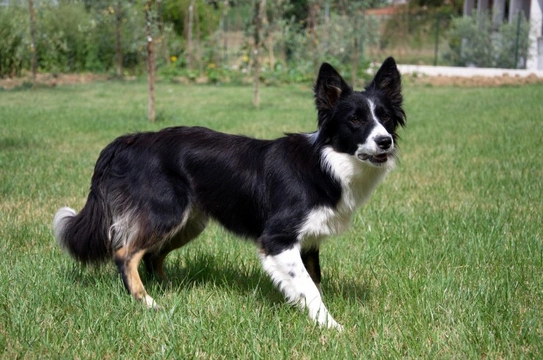
Raine syndrome DNA testing for the Border collie dog breed
The Border collie is the world’s smartest working dog breed, and people who know the breed well often say that they are almost scarily smart in their ability to predict your next command or direction and get ahead of the game! This, combined with the breed’s incredibly high energy levels and endurance makes the Border collie such a strong working herding breed, and one that is still widely used within a number of working roles today all over the UK and further afield.
These days, Border collies are hugely popular as pets too, although they do require homes that will be able to provide lots of exercise and activity, and an owner that is well versed in training and working with very smart dogs. Border collies are also an excellent pick for canine sports, for all of the same reasons that make them such a good fit for working roles.
Because Border collies are first and foremost working dogs with very recent working origins, they are not a breed that has been altered or messed with significantly by breeders to achieve a certain appearance or trait that can also be harmful to the breed’s health.
However, like virtually all pedigree dog breeds, Border collies are at risk of inheriting a number of breed-specific hereditary health conditions that can be passed on from parent dogs to their young, and one of these is called Raine syndrome.
Raine syndrome is a type of skeletal disorder that generally, results in the death of affected puppies within just a few hours of birth. This means that affected dogs rarely live long enough to be used within breeding programmes themselves, but Border collies can also be carriers of Raine syndrome without being affected by it themselves, which means that it can be passed onto subsequent generations even if their own parents are healthy.
Fortunately, a DNA test for Raine syndrome in Border collies in the UK is available to allow breeders to find out the status of their own parent stock prior to breeding from them, which in turn enables them to make healthy mating matches that stand the best possible chances of producing healthy puppies.
In this article we will provide a short outline of what Border collie Raine syndrome is, how it is inherited and spread, and how you can find out if your own Border collie might be a carrier of Raine syndrome by means of a DNA test. Read on to learn more.
What is Raine syndrome in Border collies?
Raine syndrome is a very serious disorder of the dog’s skeletal system, which is present from birth. The condition is usually fatal within a few hours of birth in affected puppies, but this is not always the case – in some cases, Border collies with Raine syndrome may live to adulthood, but they will suffer from a number of skeletal problems and defects that can affect both their quality of life, longevity, and care requirements.
How do Border collies inherit Raine syndrome?
Raine syndrome is only found within certain Border collie breed lines, and it is not a condition that affects dogs of any other breed. Even within the Border collie breed as a whole, the condition is relatively uncommon, and so DNA testing for Raine syndrome in dogs is not something that all Border collie owners are aware is available.
Border collie Raine syndrome is inherited by means of autosomal recessive heredity, which means that it is the genes that any given puppy inherits from both their dam and their sire combined that dictates their own status.
If you know the status of any two parent dogs within a prospective mating match, you can predict the status of their future offspring too. Raine syndrome status for Border collies can be either clear, a carrier, or affected. Here’s how to use this information about parent dogs to predict the status of their litter:
- Two affected Border collies will have a litter with Raine syndrome. However, this is a rare occurrence as Raine syndrome usually proves fatal in puppies at an early age.
- Two clear Border collies will have a litter that is clear.
- Two carrier Border collies will have a litter within which the pups have a 50% chance of being a carrier, a 25% chance of being clear and a 25% chance of being affected.
- Mating a clear Border collie with an affected one will result in a litter of carriers.
- Mating a clear Border collie with a carrier will result in a litter within which each pup has 50:50 chances of inheriting clear or carrier status respectively.
- Mating an affected Border collie with a carrier will result in a litter within which each pup has 50:50 chances of inheriting affected or carrier status respectively.
How can I get a Border Collie DNA test for Raine syndrome?
If you want to ensure that you make healthy mating matches and don’t inadvertently mate two Border collies that may pass on this hereditary health issue to their offspring, you will need to have both parent dogs DNA tested for the markers of Raine syndrome.
To do this, just let your vet know your intentions and ask them to take a DNA sample from the dog. This sample is then sent off to one of the UK’s approved animal genetics laboratories, who will run the appropriate tests and return a result of either clear, carrier or affected to the owner of the dog in question.



